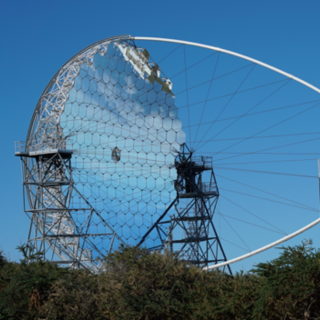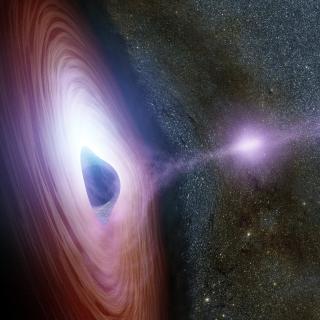Bibcode
MAGIC Collaboration; Ansoldi, S.; Antonelli, L. A.; Arcaro, C.; Baack, D.; Babić, A.; Banerjee, B.; Bangale, P.; Barres de Almeida, U.; Barrio, J. A.; Becerra González, J.; Bednarek, W.; Bernardini, E.; Berse, R. Ch; Berti, A.; Besenrieder, J.; Bhattacharyya, W.; Bigongiari, C.; Biland, A.; Blanch, O.; Bonnoli, G.; Carosi, R.; Ceribella, G.; Chatterjee, A.; Colak, S. M.; Colin, P.; Colombo, E.; Contreras, J. L.; Cortina, J.; Covino, S.; Cumani, P.; D'Elia, V.; da Vela, P.; Dazzi, F.; de Angelis, A.; de Lotto, B.; Delfino, M.; Delgado, J.; di Pierro, F.; Domínguez, A.; Dominis Prester, D.; Dorner, D.; Doro, M.; Einecke, S.; Elsaesser, D.; Fallah Ramazani, V.; Fattorini, A.; Fernández-Barral, A.; Ferrara, G.; Fidalgo, D.; Foffano, L.; Fonseca, M. V.; Font, L.; Fruck, C.; Gallozzi, S.; García López, R. J.; Garczarczyk, M.; Gaug, M.; Giammaria, P.; Godinović, N.; Guberman, D.; Hadasch, D.; Hahn, A.; Hassan, T.; Hayashida, M.; Herrera, J.; Hoang, J.; Hrupec, D.; Inoue, S.; Ishio, K.; Iwamura, Y.; Konno, Y.; Kubo, H.; Kushida, J.; Lamastra, A.; Lelas, D.; Leone, F.; Lindfors, E.; Lombardi, S.; Longo, F.; López, M.; Maggio, C.; Majumdar, P.; Makariev, M.; Maneva, G.; Manganaro, M.; Mannheim, K.; Maraschi, L.; Mariotti, M.; Martínez, M.; Masuda, S.; Mazin, D.; Mielke, K.; Minev, M.; Miranda, J. M.; Mirzoyan, R.; Moralejo, A.; Moreno, V.; Moretti, E.; Neustroev, V. et al.
Bibliographical reference
Monthly Notices of the Royal Astronomical Society, Volume 480, Issue 1, p.879-892
Advertised on:
10
2018
Citations
18
Refereed citations
17
Description
The Major Atmospheric Gamma-ray Imaging Cherenkov (MAGIC) telescopes
observed S2 0109+22 in 2015 July during its flaring activity in
high-energy gamma-rays observed by Fermi-Large Area Telescope. We
analyse the MAGIC data to characterize the very high energy (VHE)
gamma-ray emission of S2 0109+22, which belongs to the subclass of
intermediate synchrotron peak (ISP) BL Lacertae (BL Lac) objects. We
study the multifrequency emission in order to investigate the source
classification. Finally, we compare the source long-term behaviour to
other VHE gamma-ray emitting (TeV) blazars. We performed a temporal and
spectral analysis of the data centred around the MAGIC interval of
observation (MJD 57225-57231). Long-term radio and optical data have
also been investigated using the discrete correlation function. The
redshift of the source is estimated through optical host-galaxy imaging
and also using the amount of VHE gamma-ray absorption. The
quasi-simultaneous multifrequency spectral energy distribution (SED) is
modelled with the conventional one-zone synchrotron self-Compton (SSC)
model. MAGIC observations resulted in the detection of the source at a
significance level of 5.3σ. The VHE gamma-ray emission of S2
0109+22 is variable on a daily time scale. VHE gamma-ray luminosity of
the source is lower than the average of TeV BL Lacs. The optical
polarization and long-term optical/radio behaviour of the source are
different from the general population of TeV blazars. All these findings
agree with the classification of the source as an ISP BL Lac object. We
estimate the source redshift as z = 0.36 ± 0.07. The SSC
parameters describing the SED are rather typical for blazars.
Related projects

Particle Astrophysics
The members of the Particle Astrophysics Group of the IAC participate actively in three large international collaborations of high-energy astrophysics: AMS-02 (Alpha Magnetic Spectrometer), the Cherenkov radiation telescopes MAGIC I and II and the Cherenkov Telescope Array Observatory ( CTAO). We also participate in the ASTRI mini-array, the gamma
Mónica Luisa
Vázquez Acosta

Variability in Active Galactic Nuclei: Multifrecuency Studies
Active Galactic Nuclei (AGN) are characterized by a strong emission coming from a very compact region (only few pcs) at the galaxy center. Blazars form a class of AGN, characterized by high luminosity in a broad frequency range, from radiofrequencies to high energies (X-rays and γ -rays), as well as extreme variability and high polarization at
José Antonio
Acosta Pulido